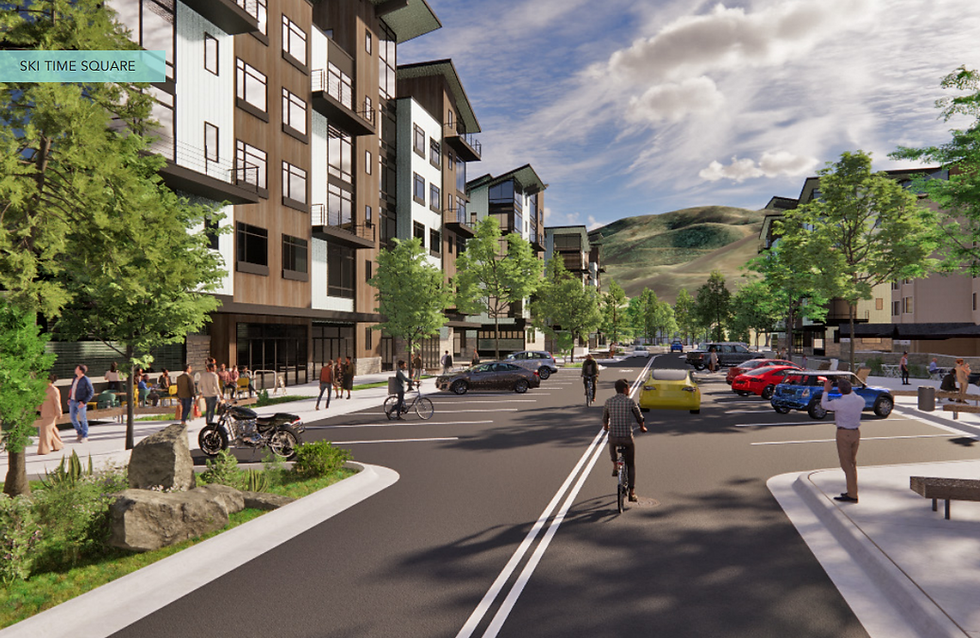Routt Commissioner's letter pushes Steamboat Council to use renewables for Ski Time Square snowmelt
- Dylan Anderson
- Jun 2, 2023
- 3 min read
Commissioners say system as proposed wouldn't be allowed when draft energy codes go into effect next year.

The Routt County Commissioners sent a letter to Steamboat Springs City Council urging them to consider a more sustainable energy source for a snowmelt system that is part of redevelopment planned at Ski Time Square.
The letter cites updated building energy codes that have been in the works for months and are set for approval later this year. If approved, those new regulations would go into effect on Jan. 1, 2024, and limit the square footage that a snowmelt system could be used for new development.
The new limits would be 450 square feet for residential property and 1,000 square feet for commercial property and limit snowmelt installation near the edges of streets where snow is piled in winter months. Proposed code updates include an exemption for snowmelt systems that are powered by 100% renewable sources.
“To be clear, this recommendation does not contemplate banning snowmelt but rather mitigating its greenhouse gas emissions impact by ensuring that it is fueled by renewable energy,” the commissioners wrote in the May 30 letter. “As you meet as the SSRA and consider whether snowmelt is an appropriate and necessary use of taxpayers’ dollars, we also ask that you consider requiring that, if installed, it be fueled by renewable energy.”
City Council is set to meet on Tuesday to decide on the snowmelt system, which is the last hurdle that is needed before the project can be bid out. When discussed last month, council delayed an ultimate decision as it wasn’t expected to delay the project starting as long as a decision was made mid-June.
A staff report created for Tuesday’s meeting notes that outdoor snowmelt systems are inconsistent with the Routt County Climate Action Plan that the city has adopted, but that the plan doesn’t include clear direction for how to apply it to development review and capital project planning. Those recommendations are coming in the updated building code.
“If limiting carbon emissions is a goal, the Town of Aspen presents a cautionary tale for why it would be better to shift policy ahead of development: Aspen now has very aggressive climate goals and policies in place, but many acres of snowmelt was permitted prior to their current codes, which will now continue to emit CO2 well into the future,” the report reads.
Under the current agreement with neighboring properties Kutuk and Torian Plum, the city would install the systems on sidewalks near their developments and the properties would assume the operations and maintenance costs. The deal allows the developments to choose which boilers to install and each has indicated a strong preference toward a natural gas system saying it has lower operational costs and is a proven method to provide snowmelt.
Unsurprisingly, city staff’s analysis showed that merely shoveling snow leads to 99% fewer carbon emissions than a gas-powered snowmelt system — “Natural gas snowmelt emits 90 times more CO2 per square foot than plowing.”
It also notes that alternatives have feasibility issues, with air-source heat pumps not being specifically suited to power snowmelt systems and would require a backup system for particularly cold days. Staffs analysis showed that while an electric system would use less energy, it would have a larger carbon footprint based on Yampa Valley Electric Association’s current power mix. This analysis was done before the co-op announced its plan to change power suppliers, which accelerates its transition to renewables.
A geothermal system has also been looked at and may ultimately be a good fit as much more snowmelt is anticipated near the base area of Steamboat Resort in a redesigned Gondola Transit Center. Still, geothermal would need to be done at a larger scale and on a longer timeline than needed for the Ski Time Square project.
Council has several ways it could move forward with the project. Council could approve the agreement as it is now and allow snowmelt to be installed knowing it will be powered by natural gas boilers for decades to come. It could delay the project until new energy codes are in place, which would force a reduction in snowmelt or a renewable energy source. It could also direct staff to renegotiate easements obtained for Ski Time Square redevelopment to require renewable energy used for snowmelt. Council could also scrap snowmelt for the project all together.
The staff report indicates that delaying the Ski Time Square project could result in delay or cancelation of property redevelopment at the base area by private owners.
Council will discuss the snowmelt system on Tuesday when they meet as the Steamboat Springs Redevelopment Authority, which governs projects funded by the Mountain Urban Renewal Authority. If the agreement is approved as it currently stands, the project would start to be advertised on June 18.
Top Photo Caption: A concept of a redesigned ski time square included in the Mountain Area Master Plan. (Courtesy/City of Steamboat Springs)



